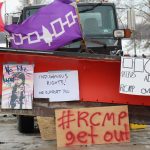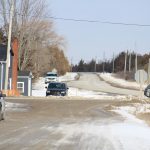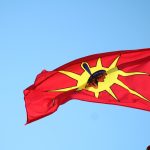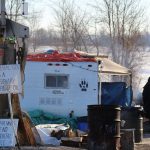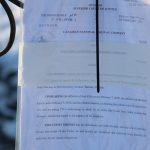All quiet at Mohawk rail stoppage, as protesters await OPP’s next move
By Olivia Waldriff, Sarah Cooke, Max Reid and Liam Radford
TYENDINAGA – Things remain quiet at the site of a protest on the CN Rail tracks east of Belleville after the OPP warned they are prepared to end the blockade near the Mohawk Territory Wednesday.
As of Wednesday afternoon there were two camps. One on Wyman Road had about 20 protesters alongside the tracks. There were two tents and two Mohawk flags, as well as a sign saying “RCMP get out.” Protesters were standing around a fire in a metal bin and milling about the campsite. Reporters from several news outlets were also on the scene.
A second camp is located six kilometres east of Wyman Road.
https://twitter.com/MaxReid_QNet/status/1227629034324086784
The OPP presence remained light. One cruiser was parked about 1.5 kilometres away from the camp, at the entrance to Wyman Road from Highway 2, and two other cruisers were parked on the opposite side of Highway 2. An OPP liaison officer approached the protesters early Wednesday afternoon to inform them of track maintenance that needed to take place.
The protest started Thursday, as members of the Tyendinaga Mohawks showed their support for the stand by the Wet’suwet’en community in British Columbia against the Coastal GasLink pipeline. A blockade was set up along the tracks, bringing to a halt all Via Rail and Canadian National Railways freight service between Toronto, Montreal and Ottawa.
Via has cancelled 157 trains since the protest began. It announced Tuesday that it has cancelled all departures on the Montreal-Toronto and Toronto-Ottawa routes until the end of the day Thursday.
On Tuesday at 4 p.m., the OPP warned the protesters that there would be raids and arrests if they didn’t clear the area. Another warning was issued Wednesday morning.
The protesters are reacting to the RCMP’s action enforcing a court order in B.C. that Wet’suwet’en protest camps must get out of out of the path of the Coastal GasLink. The natural gas line would run through unceded territory claimed by the hereditary chiefs, who have not given their permission. A number of band councils along the pipeline have signed agreements with Coastal.
Paul Latchford, manager of Loyalist College’s Indigenous Resource Centre and a Mohawk resident of Tyendinaga, told QNet News Wednesday that people he has spoken with in the community are very supportive of the solidarity protest. Many of the protesters have generational trauma because of a loss of tradition and human-rights violations such as forced attendance at residential schools, he said, adding that self-advocacy is becoming more prominent.
“Now that people are pushing for their sovereignty, these issues pop up,” Latchford said.
Chief Don Maracle, head of the band council for the Mohawks of the Bay of Quinte, gave his support to the protesters Tuesday night.
“We are both saddened and frustrated in the ‘Era of Truth and Reconciliation’ and nearly 30 years after the Oka Crisis, the Ipperwash Inquiry and all of the supposed lessons learned, that military-style interventions are still deemed acceptable approaches when it comes to complex First Nation matters,” he said in a prepared statement.
The statement also says the Bay of Quinte Mohawks are calling on both federal and provincial governments “to demand the RCMP immediately reconsider how it addresses peaceful protests and demonstrations, and allow the opportunity for sound discussion with a common sense approach to achieve peaceful outcomes.”
Although the tracks run just outside the reserve of Tyendinaga, they are still within its claimed territory.
Protesters have said they won’t leave until the RCMP leave Wet’suwet’en territory. The RCMP has dismantled the camps but are staying to ensure compliance with the court order.
 Print This Post
Print This Post

